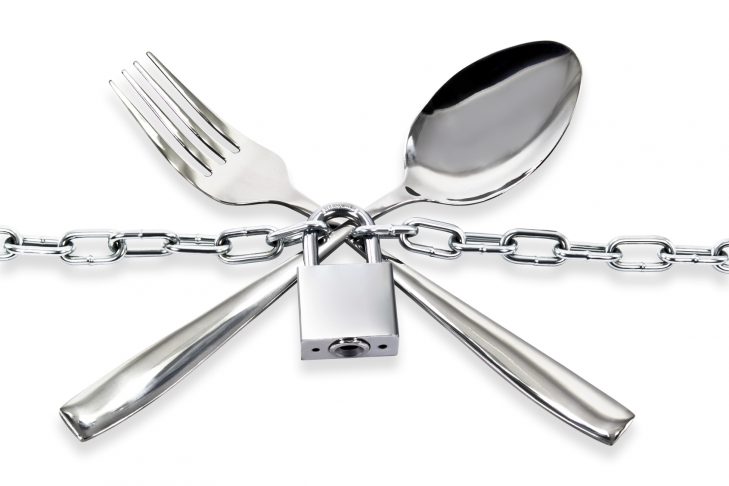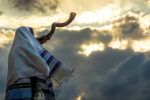There are rituals handed down from generation to generation—l’dor v’dor—that make up unbroken sequences within Jewish life. In these chains, there are also traits and health challenges that affect the generations. For example, I have inherited my grandmothers’ anxiety and depression, and now my Abuela Corina’s diabetes. I have also taken up her décor with brown plastic medicine bottles crowding my nightstand.
I take three medications for diabetes that include a weekly injection. These prescribed medications keep my blood glucose within an acceptable range. Nevertheless, my A1C tends to slide up and down. All this to say, it is a supreme effort to keep my blood sugars in check. I am chronically ill—I am Abuela’s granddaughter. L’dor v’dor.
There are many moments when I feel like a failure because of my diabetes. One of the byproducts of that failure is that I can no longer fast on Yom Kippur. I have an imbalanced body chemistry that also sets off guilt and isolation. My blood sugars began wreaking havoc when I was pregnant with my son 25 years ago. I had an acute case of gestational diabetes and was insulin dependent for the last trimester of my pregnancy. When the doctor delivered my blood test results, she said, “I bet this is the first test you’ve ever failed.” There was that word again—fail.
I feel weak—scarily so—when my blood sugars plummet to dangerously low levels. I carry granola bars in case I cannot immediately have a meal. I am terrified of fainting. The sensor I wear on my arm has a cellphone alarm that alerts me when my glucose levels have gone rogue in either direction.
Eating, in the vocabulary of the High Holidays, is a Hineini moment for me. I am fully present for whatever I must do on Yom Kippur. Eating gives me the strength and kavanah—intention—to focus on repenting. This idea is solidified for me through a collection of prayers assembled for Yom Kippur called “Prayers and Rituals for Those Who Need to Eat on Yom Kippur.” In these prayers, sin is blessedly jettisoned from the mix.
Rabbi Emily Aronson is the founder of Chronic Congregation, an organization that “provides community for Jews with chronic illness/and or disability; raises awareness of and reframes how Judaism has traditionally discussed disability and illness; offers new prayers and rituals that reflect the lived experience of disabled and chronically ill Jews.” Aronson recently wrote an open letter to clergy urging them to make a dedicated safe and respectful space to eat within the synagogue during Yom Kippur services.
She recently told JewishBoston, “The work of reclaiming Jewish text in the realm of disability and illness is countering that disability is a punishment.” Aronson further notes that understanding the need to eat is lifesaving and describes eating for health reasons on Yom Kippur as an inherently “holy act.” And as not eating on Yom Kippur is an act of self-preservation, it is as holy an act as they come.
Related
I also love this simple yet radical takeaway on the necessity of having to eat on Yom Kippur: It is a mitzvah. The idea is under the rubric of pikuach nefesh—a concept that overrules Jewish law and tradition to save a life. In search of more affirmation, I went to the “A Mitzvah to Eat” website. Founded in December 2021, the organization’s mission statement declares: “A Mitzvah to Eat supports those who need to connect to fast days, mitzvot, or holidays differently to protect their health, save their lives, or reduce their suffering. We empower individuals and communities with learning, prayers, and resources to bring holiness to acts of self-preservation.”
Empowerment and agency over one’s body is codified in the Mishna. Living as we do today under the reality of personal freedoms being taken away, I found this piece of Mishna, quoted in “Prayers and Rituals” moving: “It was taught in the Mishna: If a person is ill and requires food due to potential danger, one feeds him according to the advice of medical experts. Rabbi Yannai said: If an ill person says he needs to eat, and a doctor says he does not need to eat, one listens to the ill person. What is the reason for this halakha (law)? It is because the verse states: ‘The heart knows the bitterness of its soul’ (Proverbs 14:10), meaning an ill person knows the intensity of his pain and weakness, and doctors cannot say otherwise.”
I want to leave you with an image of a Yom Kippur version of the seder plate—food ritually curated to comfort those who do not fast on the holiday. It’s a nod to the Sephardic Rosh Hashanah seder, and the foods on this new seder plate include dates, a stand-in for righteousness; hummus to evoke the earth; water for its life-sustaining qualities; and bread, traditionally considered the staff of life and a correlation to the Rosh Hashanah ritual of Tashlich—throwing bread chunks into a body water to cast away sins symbolically.
Also, please do not assume I or anyone else fasts on Yom Kippur and wish us an “easy fast.” Err on the side of caution—wish us a day of deep reflection and spiritual nourishment. Please do not ask us how our fast was and back away when we tell you that we don’t fast. For my part, I am not confessing or repenting to you—I am diabetic and my grandmother was diabetic. L’dor v’dor comes in many iterations.
I won’t beg God’s forgiveness for eating on Yom Kippur this year. On the contrary, I will integrate gratitude for the food I must eat to stay healthy on this holiest of fast days. I will acknowledge nourishing myself as an act of pikuach nefesh. Being mindful of this lifesaving measure for which Jewish law is overruled, I fall in love with Judaism again. This suspension of the law indicates Judaism is sanctioning and enabling me to do what is necessary for my health. And this show of empathy is integral to Judaism—mine and yours.





